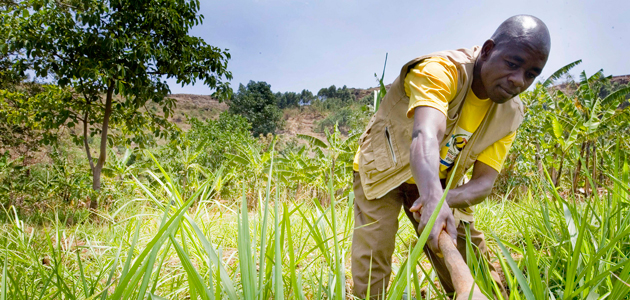Last month Emmanuel was in despair. His entire crop of maize had perished after he used a fertiliser product he now realised was fake. What could he do now that he and his family of six had nothing left to live on?
In Uganda, the sale of counterfeit agricultural inputs is a problem that affects some of the most vulnerable segments of the population. Smallholder farming provides the critical lifeline for many rural Ugandans so a threat to the integrity of agricultural input supplies is a threat to the heart of the country.
According to a report for the Bill and Melinda Gates Foundation, Ugandan manufacturers lose between US$10.7- and US$22.4 million annually due to counterfeit maize, herbicide and inorganic fertilizer sales*. These kinds of figures are staggering. The average size of a small farmer’s land in Uganda is 2.5 hectares (6 acres) and average per capita income was just $506 in 2012.
Whether in the form of fake seeds being sold in plastic bags for low prices outside of a trading centre, or diluted pesticide resold in recycled packaging, too many unsuspecting farmers like Emmanuel fall prey to these counterfeit products each year.
That’s why Transparency International Uganda decided to target this issue as the latest component of its private sector anti-corruption programme to find out what can be done.
Hotline to help get to grips with the problem
To understand the problem we set up a toll-free line, advertised through radio and TV outlets, for farmers to call in and report potential counterfeits.
In the first two months, the call centre received 187 calls, including one from Emmanuel. In these calls, farmers reported a variety of concerns including non-germinating seeds and faulty pesticides.
Transparency International Uganda cannot help Emmanuel with his maize this year, but the information that he gave us, along with that from other farmers, will allow us to understand the problem and put us in a better position to advise him and other farmers on how to avoid buying fake products in the future – and where they can go for redress.
What we are learning is that tackling the issue of counterfeit agricultural inputs requires a nuanced and comprehensive approach.
Recently we brought together seed companies, agro-dealers, manufacturers and service providers to discuss the broad scope of the problem and how to solve it.
Stakeholders welcomed the new hotline but warned more needed to be done.
First you have to find out where along the agriculture input supply chain the fake products come in. Which actor is responsible for selling a known counterfeit?
Parallel with any investigations, it is important that everyone understands the issues. Both sellers and buyers must be aware of what to look out for and what the consequences are if they are found to be mis-selling.
At the same time, farmers must also be educated. A report of a non-germinating seed does not necessarily mean the seeds were counterfeit. Seeds do not germinate for a variety of reasons, including improper use and unfavorable weather conditions.
Any report must be investigated and validated before you can conclude that a product was counterfeit. That is why Transparency International Uganda is committed to handling the issue carefully.
We are confident that this kind of approach can be a part of the solution to fighting counterfeit agricultural input sales in Uganda and will, in the future, help farmers like Emmanuel.
*This report is not available on-line but it is not confidential. Please contact the Bill and Melinda Gates Foundation for more information.
Carousel Image: Copyright, Flickr / Australian Department of Foreign Affairs and Trade
















 Connect with us on Facebook
Connect with us on Facebook Follow us on Twitter
Follow us on Twitter